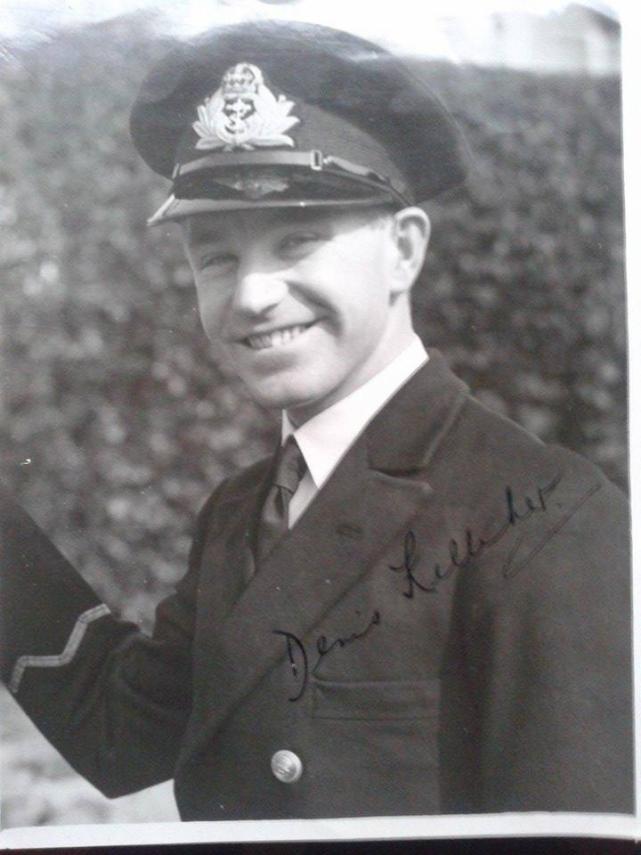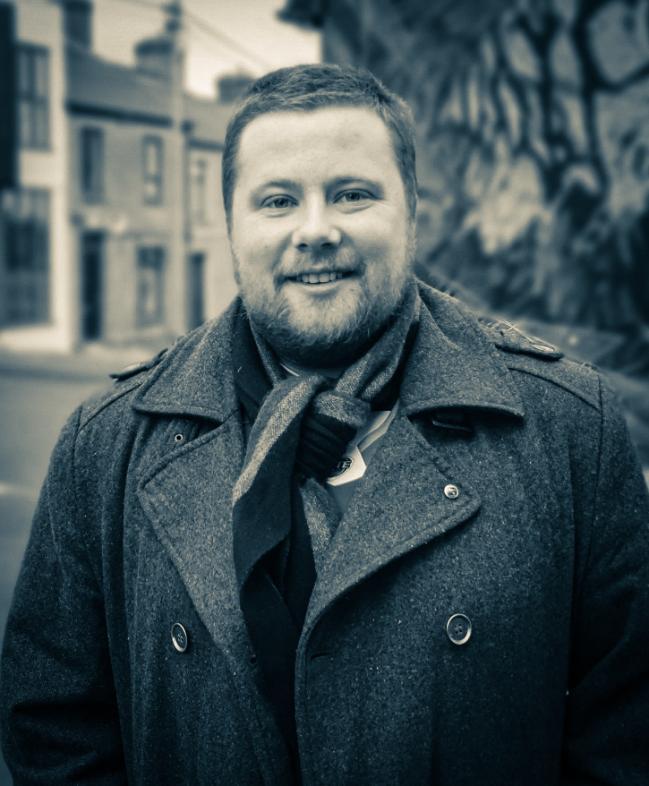Denis Kelleher: An ‘Unpredictable Irishman’
09/05/2025 - 10.43
Cian Manning
Denis Kelleher was born in Dungarvan, County Waterford on 20 November 1918, however his childhood in Ireland was brief as his family left these shores for England in 1921. It is across the Irish Sea in which Kelleher becomes a star of amateur soccer and considered ‘...without doubt the finest inside forward of his era’. A piece by David Williams profiling Kelleher as part of a series on notable amateur soccer players in 1948, noted that he always ‘...maintained the facility for the unique’.
While at St. Joseph’s College in Croydon, he excelled at various sports such as cricket and tennis, but it was the game of soccer where he really caught people’s attention. In three seasons with the school, he scored the remarkable total of 333 goals. During these displays of his prodigious talent he was spotted by former Barnet goalkeeper Harry Andrews (not to be confused with his namesake the actor in The Hill with Sean Connery, The Agony and the Ecstacy or of Man of La Mancha fame), who recommended the Dungarvan boy to the Bees.
At sixteen years old, Kelleher arrived at Underhill (the club’s ground till its redevelopment as the Hive in 2013) in 1936, for his first game for Barnet only to be refused entrance by the club’s gateman who thought this young schoolboy was merely chancing his arm. From this early blip in his sporting career success followed rapidly, at seventeen he earned his first international cap for the Irish amateur team and twelve months later played an integral part in Barnet’s London Senior Cup success over Leyton Orient at Highbury. He scored two of the goals in a four-nil victory in front of 20,000 spectators.
His goal-scoring feats also brought him to the attention of the Middlesex Wanderers, who invited Kelleher to join them on their tour of Turkey in 1939. Its raison d’etre as a touring side was precipitated due to financial matters. Their journey to Turkey was historic as they were the first British side to visit the country and played Fenerbache in the process.
Sadly, throughout Europe, such sporting endeavours were put on hold with the commencement of the Second World War. Kelleher joined the Royal Navy, becoming a lieutenant of a motor torpedo boat. During the war, he was captured at Tobruk by the Germans and held as a prisoner of war, first in Italy and subsequently Germany. Yet he managed to escape from the camp in March 1944, by cutting through a wire fence. Accompanied by an RAF pilot named Stuart Campbell, the two men managed to evade capture by disguising themselves as Dutch workers (with only blue overcoats to cover their military uniforms) reaching Lubeck.

Denis Kelleher. Source: John Adkins
Even in such circumstances, Campbell and Kelleher had time to enjoy the local hostelries. From there they managed to reach Sweden by cargo ship. And twenty-two days after their initial escape, reached England. Apparently after arriving back at his parent’s home after the ordeal, he greeted them merely by saying ‘Hi all, how’s the war?’ He was awarded an MBE for his escape.
Not only that, but only two days upon his arrival in England he played for Barnet in a game against Grays Athletic, scoring two goals.
In 1946, his playing career almost came to an abrupt end after sustaining a nasty head injury, but was able to play a part in Barnet’s greatest success. That year he scored what was to be the winning goal in a 3-2 victory over Bishop Auckland in the FA Amateur Cup at Stamford Bridge with an attendance of 53,832. The unusually named opposition can be deemed the Arsenal of this guise of the FA Cup, being the most successful club in the history of the tournament; having won it ten times as well as being runner-up on eight occasions.
The competition was set up in response to the legalisation of professionalism within football with England’s oldest club Sheffield F.C. suggesting that a separate competition be created for amateur clubs in 1892 and lasted till 1974, when it was surpassed by the FA Trophy. While with Barnet, Kelleher reached another final with the club in 1948 but lost out to a Leytonstone side one-nil. That 1946 success still remains as Barnet’s only major piece of silverware in a golden age that encompassed two Athenian League titles, three London Senior Cups and a London Charity Cup. In a time of ‘Wine and Roses’ in the history of the club, Kelleher played in 358 games for the Bees and scored an impressive 286 goals.
He was the only Irishman from the southern state of the island (which became the Republic of Ireland in the same year) that made up the Great Britain Olympic soccer team in 1948. Not only were his sporting talents recognised but that his ‘...resonant tenor notes’ were admired by many including Dutch FA officials at a dinner in Amsterdam. In the same bio piece by David Williams, he described Kelleher’s character as ‘There is something of the leprechaun in the impish twinkle of his eye.’ This would appear to be an illustration of the meaning of the name Kelleher, an Anglicization of O Ceileachair meaning ‘lover of company’.
Unlike the hullabaloo that surrounded the selection of the 2012 Great Britain team, in 1948 a trial game was held on the 8th May, under the gaze of Matt Busby (who subsequently led Manchester United to European Cup victory in 1968) in Blackpool. A special correspondent of the Observer was unimpressed by the players on display but did record that ‘...D. Kelleher (Ireland) was the only player to put any real life into his play in the first half and played like a tired man afterwards.’ In making the squad he played in the first three games, scoring his only goal of the tournament in a 4-3 defeat of the Netherlands. That Great Britain side lost in a semi-final to Yugoslavia by three goals to one.
Though Kelleher was raised in Ireland for a few brief years he did manage to play soccer on the island. He lined out for Cliftonville in the Irish League, his only game for them in 1950. In the opening fixture of the season against Crusaders much of the attention surrounded Kelleher, and he duly obliged with two goals in a three-two victory at Solitude. Around this time he had been contacted by Bohemians of Dublin to play with them in the League of Ireland but Cliftonville did not wish to release him to fulfil this offer.
His international exploits included eight caps for the Ireland Amateur side, as already mentioned his debut came at 17-year-old against Scotland, in which he scored in a 2-1 win. Perhaps his greatest moment in the green of Ireland came when he scored the winner against England in 1949, at Carrow Road, where he also captained the side. In the same year he orchestrated a 5-2 defeat of Scotland in Aberdeen’s Pittodrie coming from two goals behind at half-time. In total, he scored four goals for his country.
In March 1951, he was invited to join a touring Hendon side in Hong Kong and the Philippines for that May, however there was doubt over his participation due to his medical studies. Kelleher qualified in 1952, from St. Mary’s (while there he met his future wife Anne, whom he had six children with) and became a General Practioner at Harold Wood. He continued as a GP until 1989, retiring aged 71. Unfortunately, the onset of Alzheimer’s and Parkinson’s disease were further cruel tests of a remarkable man. In his obituary it is remarked that ‘He will be remembered by all who knew him for his humility, kindness, compassion, and, above all, his smile, which never left him, even in the later stages of his illness’ dying in 2004.
In conversation with Barnet club archivist and fan, John Adkins (who also kindly provided the photograph which illustrates this piece) outlined the esteem in which Kelleher is held in the folklore of the north London club and that his career coincided with the pinnacle era of the amateur game in England. It’s unfortunate to think that such a man whose life and sporting career were as equally interesting is not further known or acknowledged in his own birthplace and in the country he represented with such distinction.
Probably the only time you’ll read the words of Cecelia Ahern in relation to soccer (other than in reference to her Old Trafford season ticket holding father) is that Kelleher should be more than ‘…a vague face and a distant memory’, his story transcends whether in relation to issues such as emigration, the Irish in Britain, war, Irish sporting history which is as relevant to the people of Waterford today as it was weekly news to the Barnet faithful over sixty years ago.
Biography
Cian Manning is an independent researcher based in Ireland’s oldest city, Waterford. He has previously authored Waterford City: a history (2019) and ‘I Love Me County’: Waterford Sporting Stories (2024) for The History Press. To mark the centenary of the Waterford & District Junior League, Cian wrote a history of the local soccer league, titled ‘Our League’: Waterford & District Junior League, A Centenary, in 2024. Additionally, he is a frequent contributor to Ireland’s Own, Munster Express and WLR FM. Cian can be contacted on e-mail at - camanning93@gmail.com


/prod01/wlvacuk/media/departments/digital-content-and-communications/submitted-news-images/Smelting-knife.png)
/prod01/wlvacuk/media/departments/digital-content-and-communications/images-2024/250630-SciFest-1-group-photo-resized-800x450.png)
/prod01/wlvacuk/media/departments/digital-content-and-communications/submitted-news-images/Way-youth-zone-August.JPG)
/prod01/wlvacuk/media/departments/digital-content-and-communications/images-2024/Arthi-Arunasalam-teaser.jpg)
/prod01/wlvacuk/media/departments/digital-content-and-communications/submitted-news-images/Muslim-woman-playing-football.jpg)
/prod01/wlvacuk/media/departments/digital-content-and-communications/submitted-news-images/Business-School-800x450.jpg)
/prod01/wlvacuk/media/departments/digital-content-and-communications/submitted-news-images/University-of-the-Year.jpg)
